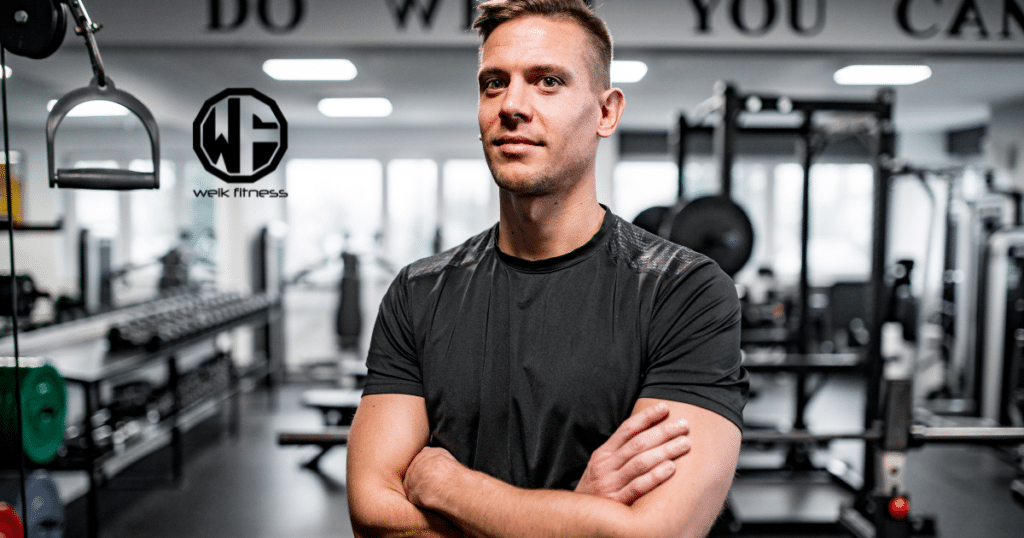12 Telltale Ways to Spot a Bad Fitness Coach or Trainer
If you’re trying to lose weight or even get ready for something like a competition, you’re generally going to want to find a coach who can fast-track your progress so you can see results sooner rather than later. It would be great to say that all coaches are on the same level but that’s unfortunately not the case – you’re bound to find a bad fitness coach during your journey.
The problem many people face is that they aren’t sure what a bad fitness coach looks like. Is it their personality? Is it knowledge? Is it their physique and whether or not they fit the part? To a degree, all of those things come into play when deeming someone a good or bad fitness coach.
To help you understand what to look for so you can be aware and get out before you waste your money, here are some key ways for you to spot a bad fitness coach.
Disclaimer: It is recommended that you speak with your doctor before starting any exercise program.
Table of contents
- What is a Fitness Coach?
- Why Should You Be on the Lookout for a Bad Fitness Coach?
- 12 Ways to Spot a Bad Fitness Coach or Bad Personal Trainer
- 1. They have a “do as I say” mentality
- 2. The fitness coach never asked for a health history
- 3. They ignore pain or injuries
- 4. The fitness coach shames you into doing something
- 5. They gave you the same workout as your friend
- 6. They are not correcting your form
- 7. The fitness coach promises you fast results
- 8. They aren’t checking your progress
- 9. They aren’t taking any notes during your session
- 10. The fitness coach is on their phone while training
- 11. They seem to only count your reps
- 12. They don’t ask you questions
- What Should You Do If You’re Working with a Bad Fitness Coach or Personal Trainer?

What is a Fitness Coach?
A fitness coach is a professional who helps individuals or groups achieve their fitness goals through personalized exercise and lifestyle guidance. Fitness coaches, also known as personal trainers or fitness instructors, possess knowledge about exercise physiology, nutrition, and motivation techniques to assist their clients in improving their overall health and fitness.
Key responsibilities of a fitness coach may include:
- Assessment: Conducting fitness assessments to determine clients’ current fitness levels, identifying strengths and weaknesses, and understanding specific health concerns or limitations.
- Goal Setting: Collaborating with clients to establish realistic and achievable fitness goals based on their individual needs, preferences, and constraints.
- Exercise Programming: Designing customized workout plans that align with clients’ goals, taking into account factors such as fitness level, medical history, and lifestyle.
- Instruction and Demonstration: Teaching clients proper exercise techniques, demonstrating movements, and ensuring they perform exercises safely and effectively to minimize the risk of injury.
- Motivation and Support: Providing encouragement, support, and motivation to clients to help them stay committed to their fitness journey. This may involve tracking progress, celebrating achievements, and adjusting goals as needed.
- Nutritional Guidance: Offering basic nutritional advice and guidance to complement clients’ fitness programs and promote overall health.
- Monitoring and Adjusting: Regularly assessing clients’ progress and adjusting workout plans as necessary to ensure continued improvement and prevent plateaus.
- Education: Sharing knowledge about health and fitness, including the benefits of exercise, proper nutrition, and lifestyle factors that contribute to overall well-being.

Fitness coaches can work in various settings, including gyms, fitness studios, private practices, or as independent contractors. Some may specialize in specific areas such as weight loss, strength training, rehabilitation, or sports performance. Overall, the role of a fitness coach is to guide and support individuals on their fitness journey, helping them achieve and maintain a healthier lifestyle.
Why Should You Be on the Lookout for a Bad Fitness Coach?

Being on the lookout for a bad fitness coach is crucial because the quality of guidance and support you receive significantly impacts your fitness journey, overall health, and safety. Here are some reasons why it’s important to be cautious and recognize signs of a potentially ineffective or harmful fitness coach:
- Risk of Injury: A bad fitness coach may lack the knowledge to design safe and effective workout programs. Incorrect exercise techniques or inappropriate intensity levels can lead to injuries, both immediate and long-term.
- Ineffective Goal Setting: A fitness coach should work with you to set realistic and achievable goals. A coach who sets unrealistic expectations or fails to tailor goals to your individual needs may hinder your progress and motivation.
- Lack of Personalization: Every individual is unique, and a one-size-fits-all approach to fitness is rarely effective. A bad fitness coach may not take the time to understand your specific needs, limitations, and preferences, resulting in a generic and ineffective training plan.
- Poor Communication Skills: Effective communication is crucial for a successful coaching relationship. A bad fitness coach may struggle to explain exercises clearly, provide feedback, or address your questions and concerns adequately.
- Unprofessional Conduct: Professionalism is key in any coaching relationship. If a fitness coach displays unprofessional behavior, such as being consistently late, canceling sessions frequently, or demonstrating a lack of respect, it can negatively impact your experience and motivation.
- Inadequate Monitoring and Progress Tracking: A good fitness coach should regularly assess your progress, adjust your program as needed, and provide feedback. If your coach is not actively monitoring your development or lacks a structured approach to tracking progress, it may indicate a lack of commitment to your success.
- Limited Knowledge Base: A bad fitness coach may lack proper education and credentials. It’s essential to work with coaches who have relevant certifications and stay updated on the latest research and trends in fitness and nutrition.
- Lack of Motivation and Support: A fitness coach should serve as a source of motivation and support. If your coach is not invested in your success, fails to celebrate your achievements, or doesn’t provide the encouragement you need, it can impact your commitment to the program.
Being vigilant and choosing a reputable, qualified fitness coach is essential for your well-being and the effectiveness of your fitness journey. Before selecting a fitness coach, consider checking their credentials, asking for client testimonials, and assessing their communication and coaching style during an initial consultation or trial session.
12 Ways to Spot a Bad Fitness Coach or Bad Personal Trainer
Below are 12 of the most common things you should look for that would tell you you’re in the presence of a bad fitness coach or bad personal trainer.
1. They have a “do as I say” mentality
When paying someone for their service, it’s not unreasonable to ask why you are doing a certain exercise or workout. A good fitness coach would tell you the exact reason so you fully understand. A bad fitness coach will simply tell you to do as they say. If you’re not getting answers, move on.
2. The fitness coach never asked for a health history
The first thing you should receive after agreeing to work with a fitness coach is a health history form. Your coach should want to know if you have any medical condition, injuries, risk factors, etc. before getting started. This is for both your safety as well as their own liability.

For instance, if someone just had open heart surgery and is supposed to keep the intensity down, that would be a good thing for the trainer to know so they don’t push you too hard too soon as the consequences could be deadly.
3. They ignore pain or injuries
If you walk into a workout with your fitness coach and explain to him or her that you’re in pain from your previous workout or the current and they don’t care… RUN! An experienced fitness coach will be able to work around soreness and will NOT push the envelope if you’re in any type of pain or may be injured. The whole “no pain no gain” is absolutely ridiculous and if those words ever come out of your coach’s mouth ask for your money back.
4. The fitness coach shames you into doing something
A bad fitness coach pushes you through shame. There is no reason for a fitness coach to tell you the results will never come with your poor effort or that you’ll never lose all that fat if you aren’t putting in the work (and that’s regardless if you’re working hard or not). Shaming someone due to the way they look currently is never a good idea and definitely not something a professional would ever do.

5. They gave you the same workout as your friend
In the industry, there are things called “cookie-cutter programs.” These are programs that are recycled from client to client. Each client should have an individualized workout, not something that is reused or repurposed with every single client. A bad fitness coach isn’t capable of providing you with a specific workout to achieve your goals and generally when working with them, you rarely ever see results.
6. They are not correcting your form
If you aren’t sure what proper form looks like, it can get you severely injured. If looking around the gym and your form looks nothing like everyone else, it should throw up a red flag. Your coach should be checking your form each and every rep and making adjustments on the fly to keep you safe.
7. The fitness coach promises you fast results
Any promise of something happening fast is a flat out lie. Nothing in the gym will ever come “fast.” It takes time to gain muscles, lose weight, build strength, enter whatever goal you wish here. If they claim they can get you quick results, they’re lying and a bad fitness coach. Or, they’ll have you doing things that are unhealthy or dangerous in order to speed up the process.
8. They aren’t checking your progress
How do you know if you’re progressing if your fitness coach isn’t checking your progress every week, every other week, or every month? The whole reason you’re working with them is to get the results you desire, right? So, why wouldn’t you want something measurable that you can actually see and track your progress?
Related Article: 1 Simple Step to Help Blow Up Your Personal Training Business
This can be taking measurements, weight, body fat percentage, strength tests, etc. Make sure your coach is constantly checking your progress so you can make the necessary changes to continue seeing results.
9. They aren’t taking any notes during your session
Does your coach walk around with a notebook or clipboard? If not, how are they understanding your strengths and weaknesses? How do they remember things you should work on next workout? Here’s the answer – they don’t. Your coach should be adapting to you from workout to workout and making the necessary changes to allow you to see progress from your work in the gym.
10. The fitness coach is on their phone while training
This is a huge NO-NO and one that drives me insane. There is no reason for your fitness coach to have his or her phone out unless they are using it as a timer or to show you your form by videotaping you performing a movement.
Far too often I see coaches in the gym doing Facebook or Instagram Lives or stories when training with clients. Exactly how do they have their focus on you when they are out there on social media focused on how many people are going to see their video?
And texting… where do you even start with this? You’re paying them to spend time with you. If they are busy texting during your session, ask to be compensated for the time they wasted or mention if it happens again, you’re done working with them. It’s unprofessional for them to be doing anything with their phone that doesn’t directly help you during the training session you’re paying for.
11. They seem to only count your reps
If I were to guess, I’m sure you can count up to at least 15, right? You don’t need someone to count for you as you could do that yourself if you really wanted to. Your fitness coach should be educating you, motivating you, encouraging you, and pushing you. You should be asking questions and trying to understand the method behind their madness and the reason you are doing certain movements.
A bad fitness coach simply stands around and counts. If this sounds like your current coach, it’s time to move on.
12. They don’t ask you questions
Another thing a bad fitness coach does is not ask questions. Your coach should be asking you how a weight felt, if you’re feeling it in the right muscle group, how your recovery has been, how your nutrition plan is going, etc. They should be asking these things so that they can make changes based on your response.

If you’re not recovering properly, they can recommend a solution. If you’re not feeling a movement in the muscle group, they can then diagnose the issue and make sure you have a solid mind-muscle connection and have the correct muscle fibers firing. Not asking questions shows they aren’t really interested – which is never a good thing when you’re paying them.
What Should You Do If You’re Working with a Bad Fitness Coach or Personal Trainer?

If you find yourself working with a bad fitness coach or personal trainer whom you consider to be ineffective or unsatisfactory, it’s important to address the situation promptly. Here are steps you can take:
- Communicate Concerns:
- Express your concerns directly to the coach. It’s possible that they may be unaware of your dissatisfaction or may not fully understand your needs.
- Be specific about the issues you’ve noticed, whether it’s lack of communication, ineffective programming, or any other aspect of the coaching relationship that is not meeting your expectations.
- Request Modifications:
- If there are specific aspects of the training program that you find problematic, discuss potential modifications. This could involve adjustments to the workout routine, changes in communication frequency, or modifications to the coaching style.
- Provide Feedback:
- Offer constructive feedback about what is working well and what needs improvement. This can help the coach understand your preferences and expectations more clearly.
- Ask for a Review Session:
- Request a comprehensive review session where you can discuss your goals, assess your progress, and evaluate the effectiveness of the current training plan. This can be an opportunity to collaboratively make adjustments to better align with your needs.
- Seek a Second Opinion:
- If you’re uncertain about the quality of the coaching you’re receiving, consider seeking a second opinion from another fitness professional. They can provide insights into whether the current approach is appropriate and effective.
- Check Contract and Refund Policies:
- Review any contractual agreements you have with the coach or training facility. Familiarize yourself with cancellation policies, refund options, or any other terms that may apply to your situation.
- Consult with Gym Management:
- If your coach is affiliated with a gym or fitness facility, consider discussing your concerns with the management. They may be able to offer guidance, mediate the situation, or provide an alternative solution.
- Consider Switching Coaches:
- If the issues persist and you are not satisfied with the resolution, explore the possibility of switching to a different coach within the same facility or seeking a new trainer elsewhere.
- Terminate the Relationship:
- In extreme cases where the issues are severe and cannot be resolved, consider terminating the coaching relationship. Prioritize your safety and well-being, and don’t hesitate to seek a more suitable fitness professional.
Remember that communication is key in any coaching relationship, especially if you feel you’re working with a bad fitness coach. Honest and open dialogue can often lead to positive changes. If, despite your efforts, the situation does not improve, it may be in your best interest to explore other coaching options to ensure that your fitness journey aligns with your goals and expectations.


*Disclosure: This article may contain affiliate links or ads, which means we earn a small commission at no extra cost to you if you make a purchase through these links. These commissions help support the operation and maintenance of our website, allowing us to continue producing free valuable content. Your support is genuinely appreciated, whether you choose to use our links or not. Thank you for being a part of our community and enjoying our content.
PLEASE CONSIDER SHARING THIS ON YOUR SOCIAL MEDIA TO HELP OTHERS LEARN MORE ABOUT THIS TOPIC. SIMPLY CLICK BELOW!

